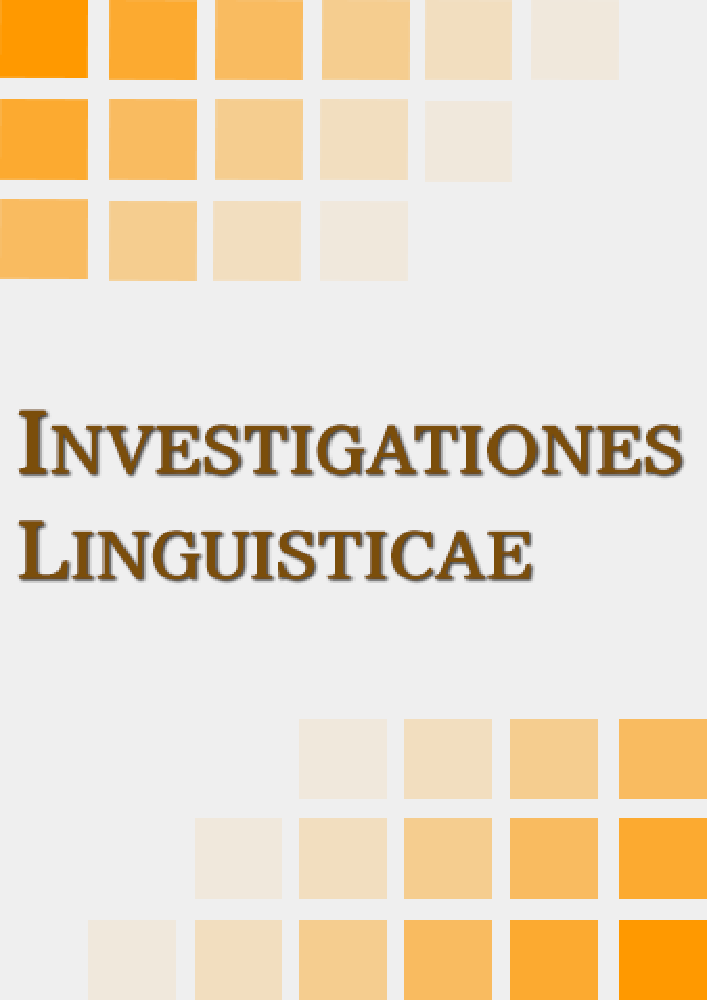Abstrakt
The present study examines the use of vocative interjections in the address forms and the politeness strategies that could be correlated with the sociocultural variables such as age, gender, kinship, social status, and educational achievements. Toward the end of this study, a situational analysis of the use of the vocative interjections and politeness strategies will also be provided. Since address forms are an important aspect of the interpersonal communication, they manifest both the identity and the status of the speaker and the person addressed (Mehrotra 1986: 80). In this paper, emphasis is put on the speaker’s choice of vocative interjection to mark the different honorific level. It will also purport how sociocultural variables affect the choice of vocative interjection in the address forms.
Bibliografia
Bahri, Hardev. Gramin Hindi Boliyaan. Allahabad: Kitab Mahal, 1966.
Biber, Douglas, Stig Johansson, Geoffrey Leech, Susan Conrad, and Edward Finegan. The Longman grammar of spoken and written English. London: Longman, 1999.
Boer, Minne. „Talking about Interjections”. Bulletin of the Henry Sweet Society for the History of Linguistic Ideas, Vol. 50. 2008. p. 31–44.
Braun, Friederike. Terms of Address – Problems of Patterns and Usage in Various Languages and Cultures. Berlin: Mouton de Gruyter, 1988.
Brown, R, and M Ford. „Address in American English.” Journal of Abnormal and Social Psychology 62. 1961. p. 375–385.
Brown, R. and A Gilman. „The Pronouns of Power and Solidarity.” In Style in Language. Ed. T. A. Sebeok. Cambridge: MIT Press, 1960. p. 253–276.
Brown P., and S.C. Levinsion. Politeness. Some Universals in Language Usage. Cambridge: Cambridge University Press, 1987.
Chatterji, Suniti Kumar. The Origin and Development of the Bengali Language. London: George Allen & Unwin Ltd, 1926.
Cuenca, Maria Josep. „Defining The Indefinable? Interjections”. Syntaxis. Vol. 03. 2000. 29-44. Web 16 July 2013. http://rabida.uhu.es/dspace/bitstream/
handle/10272/3204/b15127369.pdf?sequence=
Dickey, Eleanor. “Forms of address and terms of reference”. Journal of Linguistics. Vol. 33 (2). 1997. p. 255–274.
Felix, Ameka. “Interjections: The Universal Yet Neglected Part of Speech”. Journal of Pragmatics. Vol. 18, 1992. 101–1l8.
Gordona, George, and Dhanesh Jain. The Indo-Aryan Languages. London: Routledge, 2003.
Government of India. “Census 2001, Statement 1”. Ministry of Home Affairs. Office of the Registrar General & Census Commissioner, India. Web. 19 June 2010. http://censusindia.gov.in/Census_Data_2001/Census_Data_
Online/Language/Statement1.htm
Grierson, George A. “Indo-Aryan Family, Eastern Group, Part II, Specimen of the Bihari and Oriya Languages”. Linguistic Survey of India. Vol. V. Calcutta: Office of the Superintendent of Government, 1903.
Harganvi, Manazir Ashiq, and Vinod Chaudhary. Bihar ki Bhashayen. Delhi: Educational Publishing House, 2007.
Hook, Donald D. „First Names And Titles As Solidarity And Power Semantics In English”. IRAL. Vol. 22, Issue 3. 2009. p. 183–190.
Huszcza, Romuald. Honoryfikatywność – Gramatyka, Pragmatyka, Typologia. Warszawa: Wydawnictwo Naukowe PWN, 2006.
Jakobson, R. “Closing Statement: Linguistic Style in Language”. Ed. Sebok Thomas A., Mass: MIT Press, 1960. p. 350–377.
Jaworski, Adam. "The Vocative, First Name and the Pronoun Ty in the Polish Address System", Biuletyn PTJ. Issue XLVII–XLVIII. Warszawa: Wy-dawnictwo Energia, 1992. p. 95–104.
Jha, Shubhadra. The Formation of the Maithili Language. New Delhi: Mun-shiram Manoharlal Publishers. 1985.
Kasper, G. “Politeness”. Concise Encyclopaedia Of Sociolinguistics. Ed. Mesthrie Rajend, Oxford: Elsevier Science Ltd, 2001. p. 187–193.
Laver, J. “Communicative Functions of Phatic Communion”. Organisation of Behaviour in Face-to-face Interaction. Eds. A. Kendon, R. M. Harris and M. R. Key. The Hague: Mouton, 1975. p. 215–238.
Leech, Geoffrey. “The distribution and function of vocatives in American and British English conversation”. Out of Corpora. Studies in Honour of Stig Johansson. Eds. Hilde Hasselgard and Signe Oksefjell. Amsterdam: Rodopi, 1999. 107-118.
Leech, G. “Politeness: Is there an East-West divide?”. Journal of Politeness Research. Ed. Chris Christie. Vol. 3, Issue 2. Lancashire: De Gruyter Mouton, 2007. 167–206.
Lyons, J. Introduction to Theoretical Linguistics. London: Cambridge University Press, 1968.
Masica, Colin P. The Indo-Aryan Languages. Cambridge: Cambridge University Press, 1991.
Mehrotra, R. R. Sociolinguistics in Hindi Contexts. Berlin: Mouton de gruyter, 1986.
Mesthrie, Rajend. Language in Indenture: A Sociolinguistic History of Bhojpuri Hindi in South Africa. London: Routledge, 1992.
Neal Norrick R. „Interjections as Pragmatic Markers”. Journal of Pragmatics. Vol. 41, 2009. 866–891
Shibatani, M. “Honorifics”. Concise Encyclopaedia Of Sociolinguistics. Ed. Mesthrie Rajend. Amsterdam: Elsevier, 2001. p. 552–559.
Shukla, Shaligram. Bhojpuri Grammar. Washington: Georgetown University Press, 1981.
Singh, Durga Shankar Prasad. Bhojpuri ke Kavi aur Kabya. Patna: Bihar Rashtra Bhasa Parishad, 1958.
Singh, Shukdev. Bhojpuri aur Hindi. Varanasi: Vishvavidyalay Prakashan, 2009.
Southworth, Franklin C. Linguistic Archaelogy of South Asia. London: RoutledgeCurzon, 2005.
Tiwari, Udaynarayan. Bhojpuri Bhasha aur Sahitya. Patna: Bihar Rashtra Parishad, 1954.
Tiwari, Udaynarayan. The Origin and Development of Bhojpuri. Kolkata: The Asiatic Society, 1960.
Upadhyay, K. Bhojpuri Lok Sahitya. Varanasi: Vishvavidyalay Prakashan, 2002.
Wierzbicka, Anna. “The Semantics of Interjection”. Journal of Pragmatics. Vol. 18, 2–3, 1992. pp. 159–192
Wierzbicka, Anna. Cross Cultural Pragmatics – The Semantics of Human Interaction. Berlin: Mouton de Gruyter, 2003.
Yadav, Ramawatar. Maithili Language and Linguistics: Some Background Notes. University of Cambridge, 1981. Web. 19 June 2010. https://www.repository.cam.ac.uk/bitstream/handle/1810/227222/kailash_08_0102_04.pdf?sequence=2
Zwicky, Arnold M. “Hey, Whatsyourname!” Papers from the tenth regional meeting of the Chicago Linguistic Society. Eds. Michael W. La Galy, Robert A. Fox, Anthony Bruck . Chicago: Chicago Linguistics Society, 1974. 787–801. Web 20 July 2013. http://www.stanford.edu/~zwicky/hey-whatsyourname.pdf
